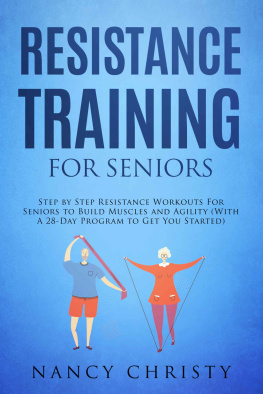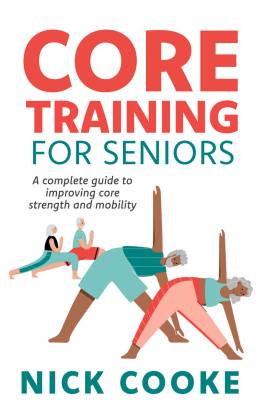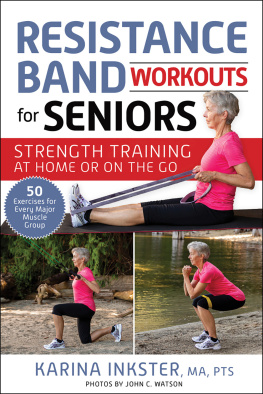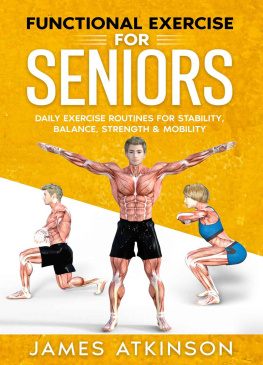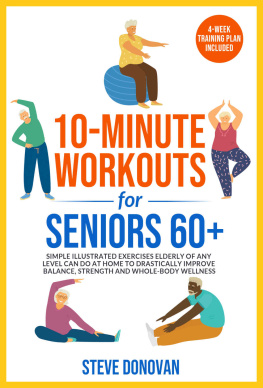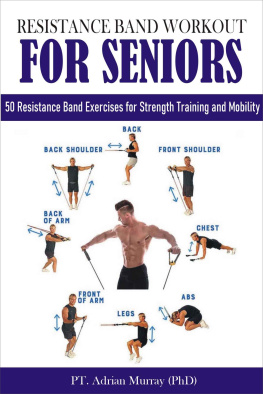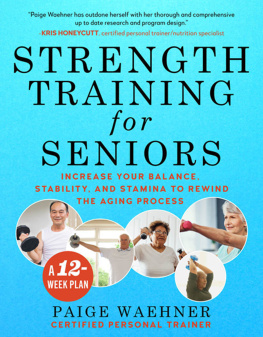THE STRENGTH TRAINING WORKOUTS BIBLE FOR SENIORS 60+
[7 in 1]
The Most Complete Guide of 200+ Simple Exercises that Elderly of Any Level Can Do Step by Step at Home
Dorian Ritter
Copyright 2023 by Dorian Ritter - All rights reserved.
The content contained in this book may not be reproduced, duplicated, or transmitted without direct written permission from the author or the publisher. Under no circumstances will any blame or legal responsibility be held against the publisher, or author, for any damages or information contained within this book. Either directly or indirectly. This book is copyright protected, you cannot distribute, use, sell or quote any part of its content without the consent of the author or publisher.
Introduction
A ging is just a natural evolution of the human body, it is inevitable, and we cannot slow it down. However, we can listen to the body's changing needs, adapt to a new lifestyle, make better choices, and exercise well to keep the bones, muscles, and mind strong and flexible.
Stiff muscles, cramps, fractures, bad posture, and the fear of falling are some of the most common worries of seniors over 60, and to a greater extent, their apprehensions are not wrong. And for the same reasons, most seniors avoid doing exercises regularly. However, studies show that careful, regular, and light exercise for at least 10-20 minutes a day helps muscles regain their strength and flexibility, which can prevent stiffness and cramps. It is good for physical health, provides mental strength, and enhances cognitive abilities. So, its a win-win for all.
However, after a certain age, our bones and muscles need extra care, so every exercise must be carried out with safety precautions in a controlled manner. There are various exercises you can try as a senior, and this 7-in-1 exercises for seniors package has compiled various exercise methods that you can benefit from. You can find them all, from stretching to resistance exercises, home workouts, and core strength exercises.
What Comes with Aging?

Questions about aging may arise, such as: why our bodies age and how old someone can get. However, getting older is more complicated than simply counting the years you've lived. Our bodies are intricate machines with a vast array of traits and capabilities. Over time, it is typical for our cells and tissue to sustain damage or make errors. In our earlier years, these changes didn't pose an issue because many of them could be easily repaired, or our bodies have the necessary reserves to compensate for them. But as we age, our capacity to repair this harm declines. Thus, it starts to accumulate and results in aging symptoms. What Happens to Your Body When You Age? It is believed that your inherited genes, or the DNA in your cells, play a role in determining how old you become. Some individuals might only begin to deteriorate later in life and live longer. However, other elements also have a favorable effect. These include maintaining a healthy lifestyle with frequent exercise, wholesome eating, emotional stability, and a strong social network.If the injured cells do not recover or die, the organs cannot function as well as they previously did. Over time, several organs also lose bulk (become smaller or "thin out"). However, this shrinkage of reserves is not apparent for a long time because our organs contain enormous reserves to handle the increased load when necessary. The classic aging symptoms start to show only until the reserves have significantly diminished.However, these aging symptoms aren't health issues, and you may usually delay them for a long time; you can perform workouts to strengthen your muscles, for instance, if they start to weaken. Sports and exercise are thought to be healthy for you, for example, to maintain the health of your other organs and your cardiovascular system (heart and blood vessels). The Typical Signs of Aging From the outside, it is possible to see several aging symptoms: your skin develops wrinkles and age spots, and your hair begins to grey. As we become older, our bodies become less able to hold fluid, which causes, for example, our spinal discs to shrink and lose their suppleness. As a result, as humans age, they become smaller. This alteration typically occurs in the body's organs and tissues over a long time without being immediately apparent. Some people don't show them until they are extreme stress or elderly age. Others experience this sooner.As we age, messages take longer to travel along our nerves, and our brains are less able to interpret information than they once were. This makes it more difficult to recall new information and respond promptly. Our sensory systems also deteriorate over time; for example, it's common to experience age-related nearsightedness in your mid-forties and hearing issues as you get older. Over time, you may also lose the ability to taste and smell certain things. What Does Growing Older Mean? Growing older entails a variety of experiences and changes, both psychologically and physically. Our body and mind adjust to outside forces at all life stages, including aging. This can gradually and unconsciously occur over time, for instance, throughout your job or family life. Or it might occur more overtly and on purpose, like while practicing for an athletic event or recovering from a terrible illness.For as long as they live, people are constantly changing. Loss, limits, and the difficulty of continually adjusting to new conditions can all be symptoms of aging. However, because aging often occurs slowly, this adaptation proceeds over time. You go through many changes with your family and friends since they age alongside you. When things go tough, staying physically active and utilizing your life experience and insight will help you overcome many of the obstacles you encounter.Contentment and happiness are as important in later years as in early ones. Numerous elderly persons enjoy retirement, free from many pre-existing expectations and limitations. Others are content to have more time for themselves, their loved ones, and their friends, while some search for new tasks. Staying active for as long as possible is physically and mentally crucial. Why is It Necessary to Exercise?

Exercise is unquestionably the best prescription for maintaining health and reducing aging throughout a lifetime. Researchers at the University of Birmingham and King's College London compared the muscles and immune systems of older persons who had consistently exercised throughout their lives to those of adults of comparable age and younger adults who had not routinely exercised. They discovered that people who exercised regularly fought against the effects of aging by possessing the immunity and muscle mass of someone significantly younger. Aging alone does not result in a reduction of immunological defense. Instead, the cause is a lack of activity.We now have solid evidence that encouraging people to commit to physical activity throughout their lives is a potential solution to the problem since we are living longer but not healthier. Regular exercise should start by late middle age (before age 65) and be done four to five times a week to reap the greatest benefits.A few aging-related changes begin as early as the third decade of life. For instance, after age 25 to 30, the average man's maximum attainable heart rate and peak blood pump capacity fall by roughly one beat per minute and ten percent, respectively. Because of this, a healthy 25-year-old heart can pump 212 quarts of blood in a minute, but a heart that is 65 years old or older can only pump 112 quarts, and a heart that is 80 years old or older can only pump approximately a quart in a minute. With simple daily tasks, this decreased aerobic capacity might result in exhaustion and shortness of breath.A man's blood vessels start to tighten in middle age, and his blood pressure usually rises. Even though there are fewer oxygen-carrying red blood cells in his circulation, the blood changes, becoming thicker and stickier and more difficult to circulate through the body.Most Americans start gaining weight in their middle years, adding 34 pounds annually. However, that extra weight is all fat because men begin to lose muscle in their 40s. This additional fat makes it more likely for LDL ("bad") cholesterol to increase and HDL ("good") cholesterol to decrease. Additionally, it explains why type 2 diabetes, distressingly prevalent in older people, rises by around 6 points every ten years in blood sugar levels.
Next page
![Dorian Ritter (2023) The Strength Training Workouts Bible for Seniors 60+: [7 in 1] The Most Complete Guide of 200+ Simple Exercises that Elderly of Any Level Can Do Step by Step at Home](/uploads/posts/book/451362/thumbs/dorian-ritter-2023-the-strength-training.jpg)
